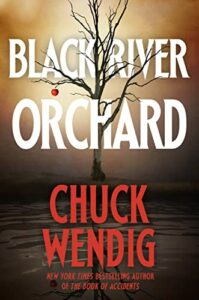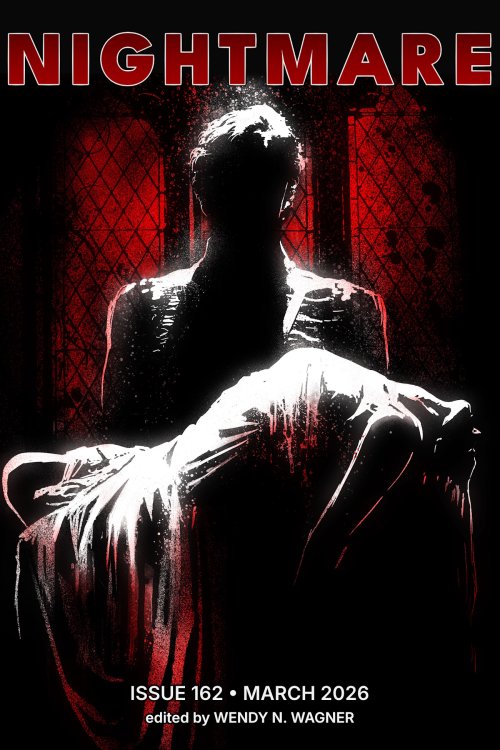How Do You Like Damned Apples?
Black River Orchard
Chuck Wendig
Hardcover / Ebook
ISBN: 9780593158746
Del Rey, September 26, 2023, 640 pages
 Here’s some behind-the-scenes, making-of-information. I wanted this to be a column about two books, one scaled at epic length and one the length of an average trade paperback. One will note that it isn’t.
Here’s some behind-the-scenes, making-of-information. I wanted this to be a column about two books, one scaled at epic length and one the length of an average trade paperback. One will note that it isn’t.
I never finished the relatively skinny one.
And so no review. I don’t review bad books in this space, for the most part; nor do I review ones I can’t finish. As a result I’ve got a hole in this column, but no disaster; I can write a little bit about the failed offering to provide contrast with the one that worked for me. I just won’t mention the title or the author, because that violates my sense of fair play.
Quickly, then: this novel was about a bunch of folks trapped in an isolated location, cut off from civilization and all possible assistance.
The murders begin.
The plot is: these folks find one of their own, gruesomely murdered. They fulminate about this.
A little later, they find another, killed in identical fashion. Then, a few hours later, another: killed the same way. Then: another. Every few hours, they find a corpse that matches the other corpses.
This goes on, and on. Nothing changes except for the countdown to zero. You know that it’s actually going to be two: the character who will become this story’s Jamie Lee Curtis and the one who will be the Michael Myers. In the meantime, the characters are revealed, but not particularly illuminated. And what you don’t get, not by a long shot, is any deeper meaning, any sense that this story has a theme beyond the ooga booga.
Horror stories don’t have to anything beyond the ooga booga, but if the story has as shallow a rise to the climax as this one’s, they certainly miss it.
And so, by contrast, I present the book I will name: Chuck Wendig’s Black River Orchard.
The story has plenty of ooga to float its booga. It’s all about a town beset by cursed apples, instantly addictive, that, as they become a delicacy, accentuate everything negative in the personalities of their consumers, rendering them selfish, evil, and ultimately murderous. You want mayhem, you will find as much here as there was to find in the novel I failed to finish.
But you know what? That’s not all it’s about.
It’s also about how many of us are already cruel, and how the dynamics of the world today are turning so many of us to take pride in how deeply we hurt the others around us.
So we have one guy, upset at the private lives of his neighbors, who takes to harassing them in moral revulsion; another guy who has used his superior financial position, over the course of years, to stymie a neighbor’s business ventures and take the proceeds for himself; a married lesbian couple where one, driven by resentment over past infidelity, seeks to control and virtually imprison the other. Plus many, many lesser examples, presented as manifestations of a greater world reflecting our own, where the privileged seek to put all those less so into smaller and smaller boxes, and among themselves present this as a form of virtue. The supernatural aspect of the plot reflects those that most resemble the real world; and they in turn reflect forces that have only accelerated in the last few years, the sense that the advancement of some completely trumps any similar attempt on the part of those who have been put in the loser column.
It is not just a stark cartoon, either. Dan Paxson, the orchard owner who grows the first batch of what come to be known as Ruby Slippers, is introduced as a nice guy. He only wants advancement for himself and for his family. He dotes on his daughter Calla, an influencer, who is at the age when everything he says, anything he advocates, is dorky and lame. He is aware that this is a stage he must accept, and so he is very patient with her. Of course, he is the first to be gradually corrupted by the apples. This is one of the things that makes this a horror-tragedy, that we believe in him and want him to shake it off, just as we wanted the same for Jack Torrance. But is all this corruption written on a blank slate that never knew a speck of darkness before the apples? There is nuance here that needs to be explored.
What I’m saying here is this book begins with a formula much richer, and thus more promising of riches, than the book I’m not naming, which seems to have nothing on its mind deeper than a fresh body being discovered every thirty pages on the dot.









